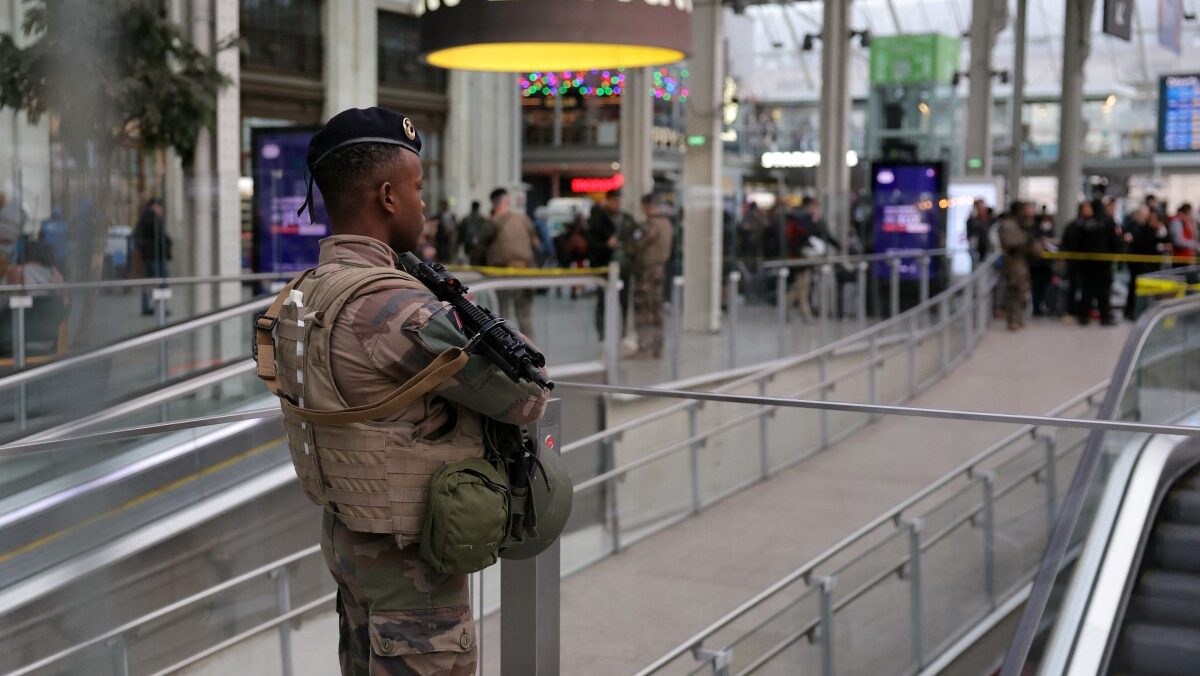
A French soldier of the Sentinelle security operation stands guard at Paris’s Gare de Lyon railway station, a major travel hub, on February 3, 2024.
Photo: Thomas SAMSON / AFP
For the second year running, France’s so-called attractiveness index has fallen. The cause is the ever-present insecurity, including terrorism and mass protests, that is seriously damaging the country’s international image.
Every year, France’s foreign trade advisors—a network of business leaders and international experts—draw up an index to measure the country’s attractiveness, based on a set of twelve criteria that apply equally to businesses and tourists.
2020 was a good year, with the index reaching an all-time high of 65 out of 100, but over the last two years, the trend has been downwards, with a drop in most of the evaluation criteria, including quality of life, personal safety, taxation, energy supply, administrative burden, and the cost of labour.
In 2022, the drop was due to the energy crisis, with a collapse in the “energy supply and cost” criterion. In 2023, it fell to 60 out of 100, with “personal safety” plummeting the most. Other criteria such as the cultural environment, quality of life, and taxation also went down.
The 2023 score for insecurity is the lowest posted by the index since it was created in 2015. From abroad, France has become infamous over the past year for the demonstrations linked to pension reform in the spring, the riots linked to the death of young Nahel in June, and the terrorist threat, with the murder of Professor Dominique Bernard in Arras in the autumn.
These major events have been compounded by a host of extremely violent incidents that have further aggravated the general climate, particularly in the capital, where the security situation has deteriorated considerably over the last few months. With the Olympic Games due to be held there in the summer, there is growing concern about France’s ability to cope with the organisational and security challenges posed by such a major event.
France’s attractiveness is particularly low for countries in North America and Asia-Pacific, even though these regions were traditionally pretty Francophile. For foreign trade advisors, the threat must be taken seriously. The issue of insecurity undermines “the historical assets linked to the attractiveness of the country for personal relocation choices (cultural environment, quality of life, etc.) and the country’s ‘brand image.’”
“While these data do not pose a direct threat to France’s ability to attract new foreign investment, they can act as a warning about its attractiveness as a tourist destination and its ability to attract executives attracted by the ‘French way of life,’” the advisors explain. The attractiveness that France has enjoyed for decades is being inexorably eroded, as evidenced by the disillusioned testimonies of tourists who can only observe the widening gap between the dream image of the country and reality.
The only positive aspect of the report is the positive assessment of the economic and administrative reforms undertaken by the government: simplification of administrative procedures; reduction in production taxes; support programmes for industry and innovation. It also highlights the upward trend in French competitiveness, which is narrowing the gap with Germany.
The French government has not yet reacted to this announcement. The explosion in insecurity remains a deep-rooted problem that it is unable to curb—in particular by refusing to accept the links between immigration and insecurity, even though the press is constantly reporting repeated scandals of murders, rapes and attacks committed by immigrants whom the state has failed to expel. Unsurprisingly, the Foreign Trade Advisors’ report makes no mention of this aspect.
